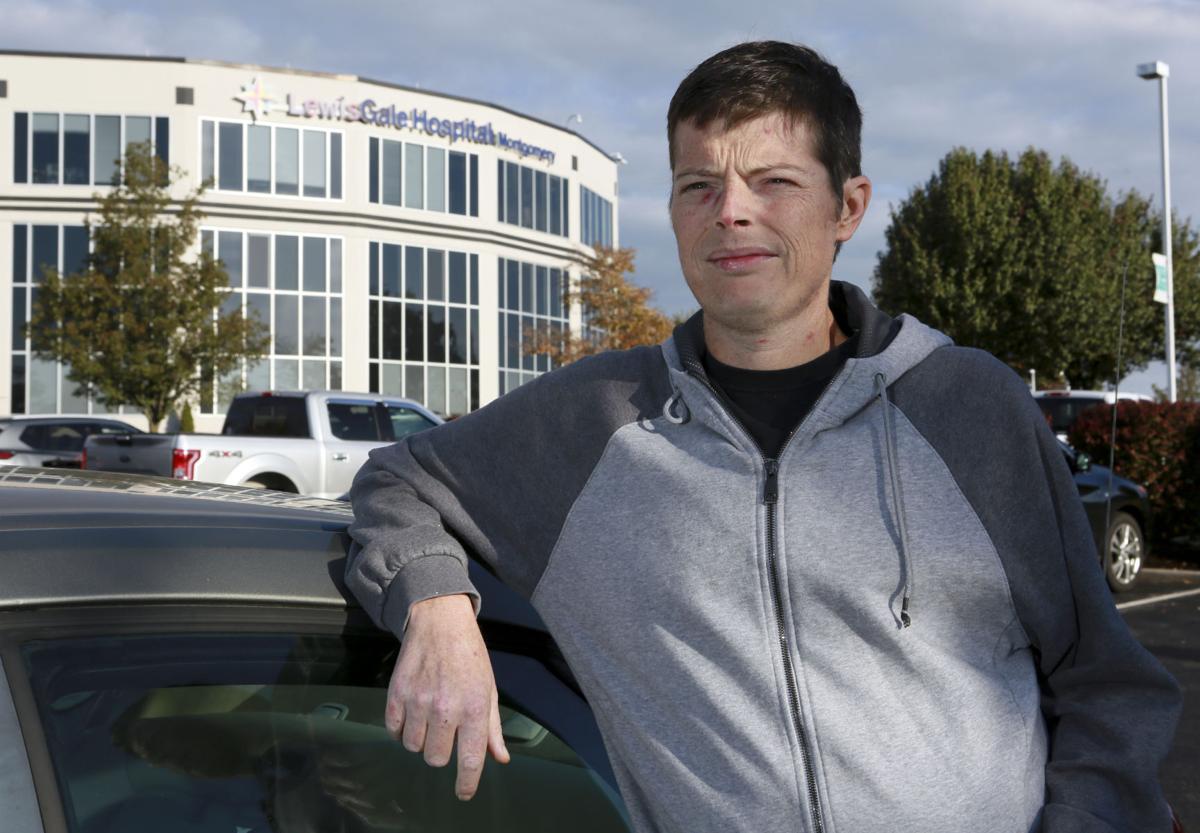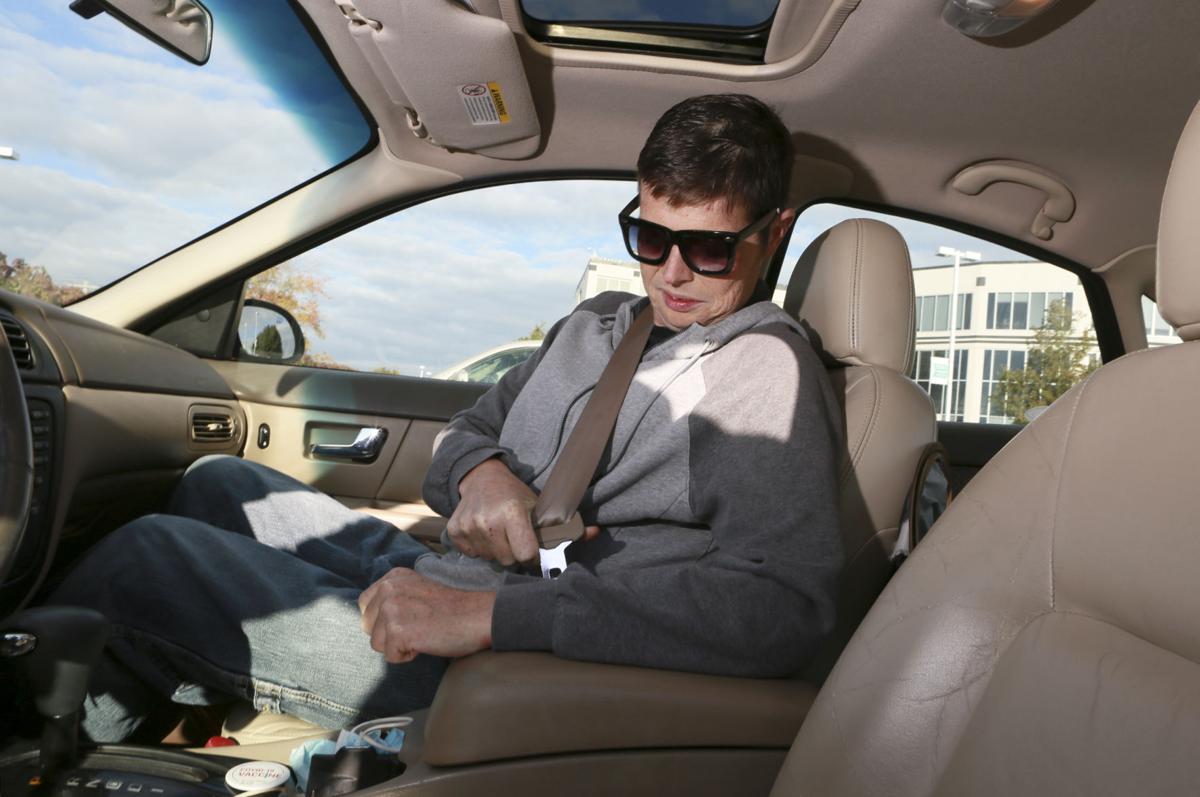RTD - A1 Jan. 14, 2022
Sean Bennett started throwing up blood, so he went to the emergency room at LewisGale Hospital Montgomery near his home in southwest Virginia. Bennett has dealt with prolonged liver disease for over a year, sending him to the hospital repeatedly.
A small community facility, LewisGale didn’t have a gastrointestinal doctor available to treat his condition, an enlarging of the veins in his esophagus called esophageal varices. There wasn’t a hospital with both a GI doctor and an available bed for 200 miles.
“They tried everywhere,” said Bennett, 38.
So LewisGale staff put him in an ambulance and sent him three and a half hours east to Henrico Doctors’ Hospital, which had a bed and a doctor.
But a few weeks later, in late summer, he was spitting up blood again, and he returned to LewisGale. This time, the closest available bed was 250 miles away at Reston Hospital Center. Doctors determined his condition was so urgent, they sent him there in a helicopter. When he became ill for a third time, LewisGale put him back in a helicopter and flew him to Henrico Doctors’, once again sending him across the state.
Six months after the nursing crisis began, omicron has brought the highest number of COVID patients to Virginia hospitals, putting hospital beds at a premium and patients with all types of ailments at risk.
Some patients, like Bennett, have been transferred hours away across the state. Others remain in hospitals ill-equipped to treat them. And others sit in emergency room beds – or chairs – waiting for an open bed upstairs.
Waiting diminishes the care the patients receive, and searching for open beds eats up the precious time of emergency room staff.
This week, the state continued setting records for hospitalized COVID patients with more than 3,500 per day. There were nearly 90,000 emergency room visits the first week of the year, 45% higher than before the pandemic began. The non-COVID patients are generally sicker than before.
Virginia Commonwealth University Health’s downtown medical center “is seeing unprecedented demand for inpatient care,” a spokesperson said.
As patients flood in, they are being treated by a smaller, weary medical workforce that lost 8,100 nurses nationwide in September alone.
This perfect storm represents a “failure of our bigger medical system as a whole,” said Dr. David Fosnocht, head of Augusta Emergency Physicians in Augusta County.
Transferred to a bigger hospital
In the fall, a patient with a brain bleed arrived at an emergency room in eastern Virginia. Dr. Todd Parker, president-elect of the Virginia College of Emergency Physicians, determined the patient needed to be transferred to a larger hospital with an ICU.
Parker and his staff contacted 17 hospitals in five states but couldn’t find an open bed. After 12 hours of searching, a bed became available in the same hospital system.
From his hospital in Hampton Roads, he has sent patients to University of Virginia Health, Duke Health and Inova Fairfax.
Before the pandemic, Fosnocht often transferred patients to Roanoke Carilion and UVA. Now, those hospitals are often full, sending him to look in all corners of the state. One night, he could find only one available intermediate-level bed – hospital beds are divided into categories based on severity of illness – in the entire state.
The longer a patient is in transit, the greater the risk, doctors say. Transferring critically ill patients to a new hospital often means taking them out of the hospital and putting them in an ambulance for an hourslong trip.
Transferring patients is labor intensive and takes a doctor’s time away from other patients. Fosnocht carries a printed spreadsheet of 25 or so of the largest hospitals in the state. It’s updated regularly to show which ones have the capacity for new patients. The open ones are highlighted.
To initiate a transfer, he calls the closest open hospital on the list. He usually starts with UVA – a 40-minute drive away – or Carilion Roanoke – an hour and a half away. When a hospital tells him it can’t accept his patient, he moves down the list and expands his geographic circle.
If he can find a receiving hospital in 15 or 30 minutes, that’s a success. The difficult transfers take hours.
For years he never transferred patients to Inova Fairfax – more than two hours away. Now he does so routinely. Sometimes he sends patients to Hampton Roads, some three hours away.
If no bed can be found, a patient might stay in a sub-optimal hospital. During one week in September, when the delta variant was at its worst, there were 27% fewer transfers than the same week in 2019.
If a patient can’t be transferred, the hospital will hold him or her, hoping conditions don’t worsen. If they don’t worsen, sometimes the patient can be released. If they do worsen, the hospital will search for a transfer destination again, asking other facilities to make an exception for a serious condition.
Transferring a patient also raises the cost of the medical bill. A 50-mile transport through the Richmond Ambulance Authority can cost $2,500.
And it occupies transport services. Augusta Health typically operates two ambulances of its own at a time, depending on staffing. If one ambulance is dispatched to Hampton Roads, half of the hospital’s ambulance resources become tied up for more than six hours.
American Medical Response operates many of the inter-hospital transports in the area. A spokesperson for the company declined to comment.
'Boarding' in the ER
Sometimes a patient doesn’t need to be transferred away, but the hospital doesn’t have a bed to offer, either. So the hospital admits the patient but keeps him or her in the emergency room while waiting for a bed upstairs, a circumstance known as “boarding.”
One day this winter, in a 50-bed emergency room in Hampton Roads, 36 beds held a patient boarding, Parker said. That creates a logjam, preventing the emergency room from seeing other sick people.
Recently, having 10 or 20 patients boarding in his ER is normal, Parker said. Long an issue in health care, boarding has been exacerbated by the nursing shortage and omicron.
Sometimes it takes two or three days for a bed to open up – maybe a patient’s entire hospital stay.
“It’s horrible,” Fosnocht said. “It continues a downstream effect on quality and being able to take care of patients the way it really should be done.”
While boarding, patients don’t get the same level of care, the doctors said. The emergency room is chaotic, noisy and bright, and it’s a hard place for patients to sleep. Instead of a dedicated nurse, staffers rotate in and out. The nurses are less familiar with the patient’s medicine and treatment. The doctor in charge isn’t down the hall – he or she is on another floor, maybe on another wing.
Those small details result in poorer care, Fosnocht said. Boarding is “a significant risk to morbidity and mortality every hour they’re there.”
When every room is full, patients may wait in chairs, be seen in the waiting room or be given a bed in a hallway.
When an emergency room can accept no more patients, it gives itself a designation known as diversion, directing ambulances to go elsewhere. Diversion isn’t unusual – one day last month, 12 hospitals in the region were simultaneously on some form of diversion, unable to accept certain patients based on their medical needs.
In less urban areas, hospitals can’t go on diversion, because there are no other nearby facilities.
Lower staffing
Burnt out, nurses have left emergency rooms and intensive care units in droves. In Virginia, the workforce of about 100,000 nurses is probably 10% below what is needed, Kathy Baker, associate chief nurse for VCU Health, said in the summer.
The number of nurses employed can sometimes dictate the number of beds a hospital can keep open. At Augusta, fewer nurses have forced the hospital to operate about 25% fewer beds than ideal, Fosnocht said. The three major health systems in Richmond – VCU Health, Bon Secours and HCA – declined to say how many nurses they have lost this year and if they are staffing fewer beds.
The hospital’s other option is to operate the same number of beds with fewer nurses, stretching their staff thinner, giving every nurse more patients to care for.
“There are just no options for nursing staffing right now,” Fosnocht said. “It’s a nationwide crisis, and it certainly is in Virginia and locally here as well.”
Hospitals are left competing for scarce resources, squeezing their budgets to pay nurses more, even though they aren’t receiving higher reimbursement from insurance companies.
In response to the surge and staffing shortage, former Gov. Ralph Northam declared a limited state of emergency last week designed to allow hospitals to expand their staffing capacity.
Sometimes it’s easier to send a patient not to the hospital 30 minutes down the road but to the one three hours away. That’s what happened to Bennett.
A hospital will go to greater lengths to accept a patient already in the health system. Because large hospitals are already taking patients from smaller facilities in their own system, they often cannot accept patients from other systems.
When Bennett got sick and went to Montgomery LewisGale, he entered a facility owned by HCA Virginia Health System. Doctors sent him to two other HCA hospitals – Henrico Doctors’ and Reston Hospital Center. A spokesperson for HCA said doctors consider a patient’s needs, bed availability, the timeliness of the transfer and continuity of care to decide if the patient will stay in the system or leave it.
When Bennett arrived at Henrico, his gastrointestinal doctor recommended Bennett stop visiting LewisGale, because he’d keep getting transferred, Bennett said. The doctor recommended Carilion Roanoke Memorial Hospital, about a 40-minute drive from his home. It’s the largest hospital in the Carilion system, and it was unlikely Bennett would be transferred farther from home.
So Bennett started visiting Carilion, and he hasn’t been transferred since. But that doesn’t mean the care has been quick. Sometimes he has waited four or five hours before seeing a doctor.
"crowded" - Google News
January 15, 2022 at 10:00PM
https://ift.tt/327tare
Crowded hospitals in Virginia have few open beds to offer the rush of patients - Richmond.com
"crowded" - Google News
https://ift.tt/39CzplD
https://ift.tt/3c6iubT
Bagikan Berita Ini



















0 Response to "Crowded hospitals in Virginia have few open beds to offer the rush of patients - Richmond.com"
Post a Comment